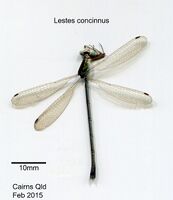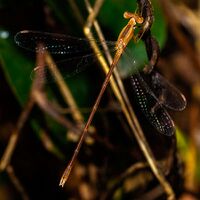Lestes concinnus
| Dusky spreadwing | |
|---|---|
| File:Lestes concinnus damselfly (31576906274).jpg | |
| Female, Thailand | |
| File:Lestes concinnus male (26987762254).jpg | |
| Male, Thailand | |
| Scientific classification Edit this classification | |
| Domain: | Eukaryota |
| Kingdom: | Animalia |
| Phylum: | Arthropoda |
| Class: | Insecta |
| Order: | Odonata |
| Suborder: | Zygoptera |
| Family: | Lestidae |
| Genus: | Lestes |
| Species: | L. concinnus
|
| Binomial name | |
| Lestes concinnus | |
| File:Lestes concinnus distribution map.svg | |
| Synonyms[3] | |
| |
Lestes concinnus is a species of damselfly in the family Lestidae,[4] the spreadwings. They are so named because they rest with their wings spread. This species is known commonly as the dusky spreadwing.[5] It is a nomadic damselfly found in India, Southeast Asia as far as New Caledonia, and northern parts of Australia.[5] The adult is a medium-sized damselfly about 40 millimeters long with a wingspan around 45 millimeters. It is dusky-grey on dorsal surfaces graduating to light bluish-green on the sides and beneath. In Australia, the distribution is in suitable habitat in the north-west and north-eastern part of the continent from about Broome to the south-eastern Queensland border.[5] This species can be found in freshwater habitat types such as river lagoons, ponds, and swamps. Its population size is unknown but it has a wide range. Threats to the species have not been assessed. It is listed as a least-concern species on the IUCN Red List.[1]
Taxonomy
Lestes concinnus was described in 1862 jointly by Hagen and Sélys. Sélys described a new species, Lestes umbrina in 1891 from the specimens he purchased that are collected by Atkinson. Laidlaw and Fraser considered that this can be a synonym of L. concinna.[6] M.A. Lieftinck (1934) synonymised these two species and after that these two species were considered synonyms until 1960; he himself restored the status of these as two different species.[7] Laidlaw also described another species, Lestes thoracicus. Dumont et al. compared the specimens of these three species and concluded that they are synonyms as no structural differences were found among the color forms, varying from pale sand-coloured to greenish-blue.[3]
Gallery
-
Female, Cairns, Queensland, Australia
-
Female, Thailand
-
Male showing blue abdomen
-
Head
-
Wing vein diagram right forewing
-
Photo of female wings
-
Photo of male wings
See also
References
- ↑ 1.0 1.1 Dow, R.A. (2017). "Lestes concinnus". IUCN Red List of Threatened Species. 2017: e.T158656A83379420. doi:10.2305/IUCN.UK.2017-1.RLTS.T158656A83379420.en. Retrieved 20 November 2021.
- ↑ Selys-Longchamps, E. (1862). "Synopsis des Agrionines, seconde légion: Lestes". Bulletin de la Classe des Science, Académie Royale de Belgique. 2 (in French). 13: 288–338 [321].
{{cite journal}}: CS1 maint: unrecognized language (link) - ↑ 3.0 3.1 Dumont, Henri J.; Ikemeyer, Dietmar; Schneider, Thomas (2017). "Lestes concinnus and L. pallidus; two non-metallic species with wide complementary ranges (Odonata: Lestidae)". Odonatologica. 46: 99–110. Retrieved 8 September 2020.
- ↑ "Species Lestes concinnus Hagen, 1862". Australian Faunal Directory. Australian Biological Resources Study. 2012. Retrieved 10 April 2017.
- ↑ 5.0 5.1 5.2 Theischinger, G; Hawking, J (2006). The Complete Field Guide to Dragonflies of Australia. Collingwood Vic.: CSIRO Publishing. p. 30. ISBN 978-0-64309-073-6.
- ↑ C FC Lt. Fraser (1933). The Fauna of British India, including Ceylon and Burma, Odonata Vol. I. Red Lion Court, Fleet Street, London: Taylor and Francis. pp. 53-55.
- ↑ Lieftinck, M.A. (1960). "On the identity of some little known southeast Asiatic Odonata in European museums described by E. De. Selys Longchamps, with descriptions of new species". Memoirs of the Entomological Society of Italy. 38: 229–256.
External links
- File:Commons-logo.svg Media related to Lestes concinnus at Wikimedia Commons
- File:Wikispecies-logo.svg Data related to Lestes concinnus at Wikispecies
- IUCN Red List least concern species
- Lestes
- Odonata of Asia
- Odonata of Oceania
- Odonata of Australia
- Insects of Australia
- Insects of Southeast Asia
- Insects of India
- Insects of Indonesia
- Insects of New Caledonia
- Least concern biota of Asia
- Least concern biota of Oceania
- Taxa named by Hermann August Hagen
- Insects described in 1862
- Damselflies

